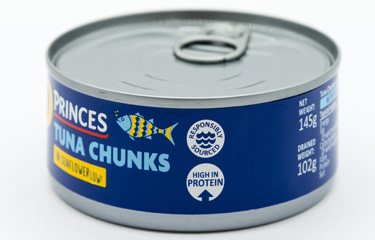Liverpool, United Kingdom-based food and beverage group Princes has launched a roadmap toward achieving 100 percent sourcing of its U.K. Princes branded tuna from Marine Stewardship Council-certified sustainable fisheries by the end of 2025.
The roadmap features three key milestones designed to increase Princes’ sale of MSC-labeled tuna products to 25 percent of its overall tuna sales by the end of 2023, 50 percent in 2024, and 100 percent by the end of 2025. Achieving the 100 percent milestone will equate to the sale of 75 million cans, or 11,000 metric tons, of MSC-certified tuna per year under the Princes brand, resulting in a fivefold increase in the amount of certified sustainable tuna available in the U.K. market, based on current volumes.
Princes said its support of tuna fishery improvement projects (FIPs) over the past five years is now paying off, with many of these now maturing and meeting MSC standards. To meet its sustainable sourcing goals, Princes said it will increase its reliance on newly MSC-certified fleets, in addition to the group’s existing MSC-certified suppliers. Princes Group Director for Seafood Neil Bohannon said the brand is committed to supporting the long-term sustainability of tuna stocks, and recognizes the important role it has to play in advocating for continued improvements in fishing practices and positive change.
“That is why we committed to only purchasing tuna from fisheries that are MSC-certified, engaged in a FIP working towards MSC certification, or from verified and well-managed [fish-aggregating device]-free or pole-and-line sources – achieving this longstanding ambition in 2021 – and now we’re going a step further,” Bohannon said. “Our 100 percent MSC-certified sustainable sourcing goal is another ambitious target, but one that we are confident in reaching through continued investment and engagement with retailers, fisheries, NGOs, and other industry players.”
Referencing the 2021 MSC Tuna Shopper Report, Bohannon said while more global fisheries are achieving MSC certification, and global sales of MSC-labeled tuna hit over 100,000 MT for the first time in 2021, the volume of MSC-certified tuna products sold in the United Kingdom decreased by 12 percent against 2020.
Bohannon said “important progress” has been made by global fisheries to achieve MSC standards in recent years, but that brands and retailers also have a crucial role to play in advancing seafood sustainability by making more certified sustainable products available to shoppers.
“Consumers want reassurance that the fish they are eating has been sourced sustainably and MSC certification is the best way of doing this,” he said.
Princes’ latest commitment follows the achievement in March 2022 of its longstanding ambition to responsibly source all its branded tuna from either a FIP or MSC-certified source. And in 2021, Princes also reached its goal of reducing its Indian Ocean yellowfin tuna sourcing by 50 percent on 2017 levels, a year ahead of its 2022 deadline, to support the long-term sustainability of the stock there.
In 2019, Princes was one of the founding partners of a pole-and-line tuna FIP in Senegal. This followed Princes’ investment as a founding member of the Sustainable Indian Ocean Tuna Initiative (SIOTI), a partnership of tuna processors, vessel owners, government agencies, and WWF to help the purse-seine fishery in the region meet MSC sustainability standards.
Its two tuna processing sites in Mauritius are MSC chain of custody certified, and it recently invested in constructing a new bio-plant venture with Energie des Mascareignes that will reduce the carbon-dioxide emissions from its Mauritian tuna-processing sites by 8,650 metric tons (MT) per year.
Photo courtesy of James McDowall/Shutterstock







